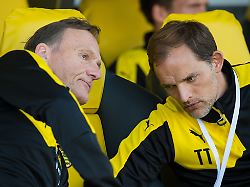“Explosion Squared”
How Watzke and Tuchel fall apart
03/30/2023, 4:20 p.m
Bayern Munich’s new coach Thomas Tuchel and Hans-Joachim Watzke have a complicated relationship. A documentary about the attack on the BVB team in 2017 now offers new insights. Before the exciting top game, the relationship between the alpha animals still seems tense – despite the discussion.
Being able to change roles in a playful way is a gift for Hans-Joachim Watzke these days. Only in his function as chairman of the supervisory board of the DFL does the boss of Borussia Dortmund speak about the new coach of FC Bayern. “For the league we say: Welcome back, Thomas Tuchel!” Watzke told the sports information service, and he repeated it almost verbatim in the “SZ” interview.
Even before the most exciting Bundesliga summit in many years on Saturday (6.30 p.m./Sky and in the live ticker at ntv.de) the relationship between the alpha animals is considered complicated – despite a discussion. Watzke and Tuchel fell out after the bomb attack on the BVB team six years ago: A Sky documentary worth seeing (from April 10), which is available to the sports information service, offers new, sometimes dramatic insights. “I think something went wrong between the coach and me,” says Watzke, rubbing his face thoughtfully. “Otherwise it probably wouldn’t have come to a breakup in the summer. To believe that such a break doesn’t trigger anything…” he says – and lets this sentence run out.
Tuchel is on the bus, Watzke is not
When the BVB bus left the Hotel L’Arrivee in the Höchsten district on April 11, 2017 for the Champions League quarterfinals against AS Monaco, Tuchel was on board, Watzke was not – the “dissent” that Watzke later expressed in a sensational WAZ interview will concede probably has its origins in that. The assassin Sergej W. detonates three explosive devices equipped with metal pins in a hedge, he has gambled on a sinking BVB share.
After that, nothing is the same as before.
Marc Bartra has injured his arm and is fighting the impending fainting, a bolt even hit a headrest. There could have been deaths.
Ten kilometers away, Watzke doesn’t initially know what’s going on. “Is this an isolated attack – or is something else coming? Of course we were incredibly scared,” he says in the documentary. “Every second thought I could have during this phase was: If something goes off and people die, that’s a disaster.”
He later spoke reassuringly to the spectators on the lawn, reporting that Tuchel was “of course shocked. An explosion was right on his side.”
“There was (…) only this one truth”
Sporting action must be taken quickly: UEFA is putting pressure on them. “There was (…) only one truth: either we play the next night or we withdraw.” And, as Watzke describes it, politicians are also gently pushing up to the chancellor in a subtle way: it would be nice if we didn’t have to bow to terror.
The game is then played, the shocked pros hardly get the ball straight, Sven Bender scores an own goal at 2:3. Tuchel then complained publicly: “We wanted more time to process it. We didn’t get it.” He and the team were not asked. Nuri Şahin says: “I didn’t give a damn about football that day.” After all, 24 hours earlier he thought terrorists would storm the bus and “shoot” players.
Watzke is irritated. According to the club management, there was always the chance to report to the top that playing was not desired. Tuchel, it seems to him, speaks with two tongues. A simmering conflict – the coach had previously fallen out with chief scout Sven Mislintat – eats deeper. The fracture can no longer be repaired.
“A heap of broken porcelain,” is how the Sportschau describes it in retrospect: the separation from Tuchel after winning the cup was “as surprising as the sunrise on May 30”. On Saturday, Tuchel will bring the personnel for the already charged summit duel “Brisanz im Quadrat”.
